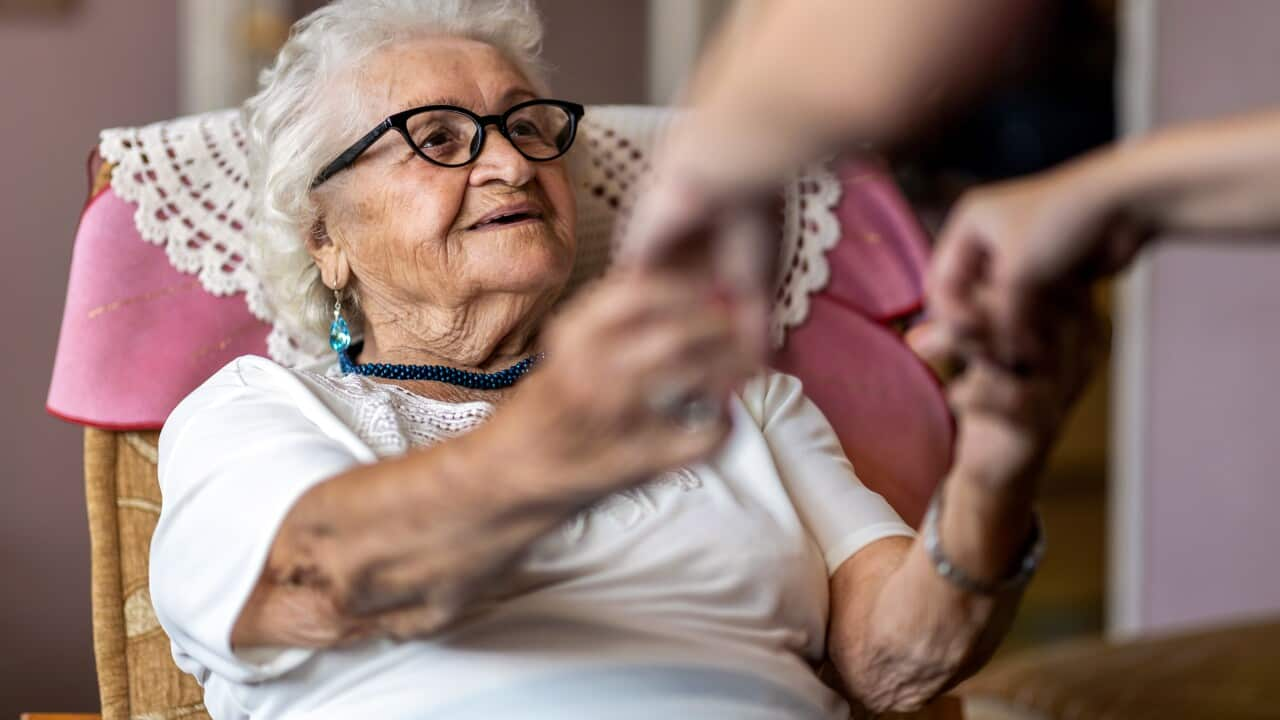Listen to Australian and world news and follow trending topics with SBS News Podcasts.
TRANSCRIPT
Until her mid-eighties, Lee Hodgson was fit, healthy and engaged with the community through the Older Women's Network.
"I was State President of Queensland for six years. I ran a branch in Gympie for 13 years."
But last year, aged 85, she underwent radiotherapy for a cancer affecting her nose - and this year she suffered a heart attack requiring a series of operations, from which she is still recovering.
With her husband Andrew also suffering from chronic health conditions, she says, everyday tasks like cleaning the house, or even having a shower, have become difficult.
"It really puts a lot of stress on your mental health, on your, what you're dealing with - your health, the problem you're dealing with. You get anxious. You get irritable."
Lee and Andrew were first assessed for in-home support at the start of last year before she fell ill.
She was assessed again after her cancer treatment - and yet again recently.
But she says the two hours a fortnight of cleaning services she eventually received not enough, and even that support is irregular.
"You pay your taxes all your life. And when you get to this age here I am needing some help for the first time in my life and we can't get it."
With an ageing population, Australia is facing skyrocketing demand for aged care services.
According to the Treasury, within 40 years, the number of people over the age of 65 is expected double, and the number of people aged over 85 will triple.
Craig Gear, the CEO of the Older Persons Advocacy Network or OPAN [[o-pan]], says that presents governments with a challenge.
"It's fantastic in Australia that we have an aging population and we have more older people around. But we need to make sure that we've provided a financial system and a financially viable aged care system that some of the levers in this new act help contribute to that."
From Saturday the 1st of November, sweeping reforms to aged care will come into effect, under the new Aged Care Act which passed parliament a year ago.
They're the long-awaited result of the Royal Commission into Aged Care Safety and Quality, which delivered its final report in 2021, to repair a system which many saw as broken.
The government has already acted on some recommendations of the Royal Commission - such as increasing wages for aged care workers, and boosting supervision of residents in nursing homes.
Craig Gear says the changes represent an new approach to aged care.
"What the New Aged Care Act does is one, it does bring in improved quality standards, which the Royal Commission said was way needed into the aged care system. It also provides greater protections for older people through greater powers of the regulator. It brings a statement of rights that providers have a positive duty to actually uphold the human rights of older people, and it also allows older people to continue to make the decisions for themselves through the supported decision-making framework."
But, there is much anxiety in the community, the sector and among advocates about the new funding model.
Under the new Aged Care Act, the current system of Home Care Packages will be replaced by the new Support at Home program, which will require users to fund more of their services.
The Green party's spokesperson for older people, Senator Penny Allman-Payne, says the system will benefit private providers.
"This week the [[Aged Care]] Minister was out saying how the profits of Aged Care Providers are up. The Minister is celebrating increasing profits for aged care providers, while older people are going to pay the cost."
Under the new system, clinical services such as nursing and physiotherapy will be covered by the government.
But recipients will need to make co-payments for non-clinical services, at a rate determined by their income and assets.
For personal care such as showering, help with medication, transport, or home modifications, a full pensioner will pay 5 per cent of the cost of the services.
Part pensioners and self-funded retirees could pay up to 50 per cent.
In September, the independent Aged Care Inspector-General Natalie Siegel-Brown reported that older people could forgo having a shower or washing clothes because they couldn't afford to pay for it.
Many advocates, like Older Women’s Network National President Beverly Baker, say older people should not be charged for help with showering.
"If you are an older woman, you know that showers are really vital for your personal health wellbeing and basically your capacity to look after yourself. But if you are in danger of falling over in the shower or having an accident in the shower and you need support to have a shower that's viewed as personal. That's not personal, that's medical, it should be under clinical care."
For what's considered everyday living services - such as cleaning, gardening and meal preparation - older people will have to pay even more - 17.5 per cent for a full pensioner and up to 80 per cent for part pensioners and self-funded retirees.
Those already assessed for or receiving Home Care Packages before the 12th of September 2024, will not have to pay more - and contributions for non-clinical services will be capped at $130,000 over a lifetime for everybody.
Beverly Baker says many older people cannot afford those costs.
"This will be a major impact, especially if those women are renting - how on earth? - they're already struggling to pay rent. How on earth are they going to pay extra for services? User-pay is not a good approach, and baby boomers aren't all rich."
There is also concern the changes will not meet growing demand by people like Lee, who want to age at home, so they can stay connected and contribute to the community.
Across Australia, there are some 200,000 people either waiting to be assessed or to receive aged care support in their homes.
The government has committed to release 83,000 new funded Support at Home places, by the middle of next year - and has already brought forward funding for 20,000 new places.
It's also promised to bring wait times for Support at Home packages down to an average of three months - by 2027.
Patrick Reid is the Chief Operating Officer of Uniting NSW.ACT, which provides residential and home care aged services.
He is calling for the government to release twice as many new Support at Home places, saying long wait times for at-home care creates pressures on hospitals and residential aged care systems.
"What we're seeing is pressure on residential aged care. We know our occupancy in that sector is very high, but also to on our hospitals, we know that there are a number of hospitals around the country which are experiencing delayed discharge, where people are languishing in hospitals for long periods of time and do not have access to either residential aged care or to return home."
And that leads to the issue of availability and funding for Residential Aged Care.
A government review of the current pricing system for residential aged care, such as nursing homes, is underway; looking at the government subsidy for people entering care who can't afford to pay a large refundable lump sum to aged care providers for non-clinical costs.
Under the new Aged Care Act, providers will be able to charge more for the refundable accommodation deposit - to those who can afford it, putting those who can't at a potential disadvantage, in a system that's nearly at full capacity.
Craig Gear - from OPAN - says people with complex needs - or lower means - can find it difficult to find residential care.
And he says, that's not good enough.
"We don't want a two-tiered system. We want anyone, no matter what their means are to be able to receive high quality aged care in Australia."













